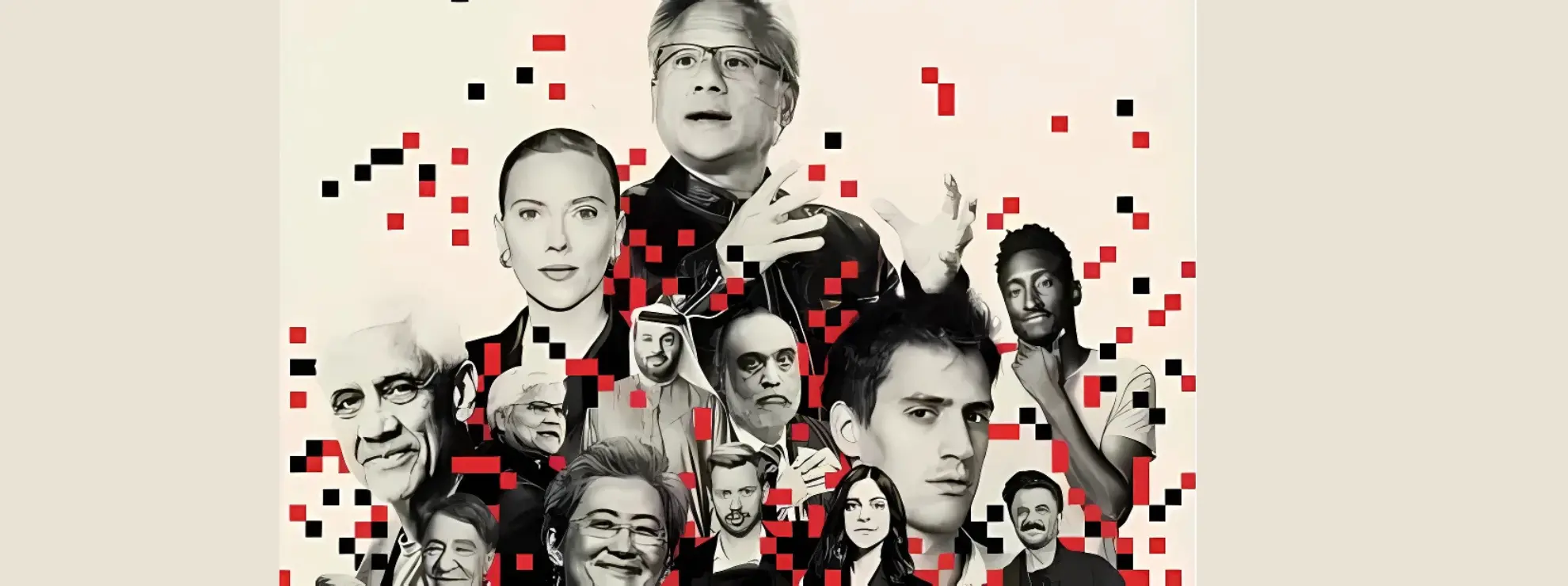(November 25, 2024) Artificial intelligence (AI) has become one of the most transformative forces of our time, reshaping industries, redefining creativity, and influencing global policy. In 2024, TIME magazine recognized the individuals steering this revolution with its “100 Most Influential People in AI” list.
Familiar names like Sundar Pichai, CEO of Google, and Satya Nadella, CEO of Microsoft, continue to dominate global conversations about AI. But this year’s list also sheds light on a host of other Indian innovators making profound, yet often understated, impacts on the field.
Global Indian puts the spotlight on the Indians who form the vanguard of AI tech, making their mark in unconventional ways. From policymakers like Ashwini Vaishnaw, who is putting India at the forefront of AI development, to pioneers like Anil Kapoor, addressing ethical challenges in entertainment, the breadth of Indian contributions is vast. Innovators such as Rohit Prasad of Amazon and Aravind Srinivas of Perplexity are redefining how AI interacts with everyday life, while thought leaders like Amandeep Singh Gill and Divya Siddharth are ensuring the technology is guided by principles of fairness and inclusion.
Ashwini Vaishnaw: Architect of India’s AI Revolution

Ashwini Vaishnaw. Minister for Railways, lnformation and Broadcasting, Electronics & Information Technology, Government of India.
Ashwini Vaishnaw, India’s Minister of Electronics and Information Technology, is spearheading the country’s ambitious plans to become a global leader in artificial intelligence. His tenure has been marked by a strategic focus on innovation, skill development, and democratization of AI technology.
At the heart of these efforts is India’s AI Mission, which Vaishnaw describes as a collaboration between “industry, government, and academia.” In partnership with Meta, the government launched the Center for Generative AI at IIT Jodhpur and introduced the YuvAI Initiative to train 100,000 students in large language models (LLMs). “Our AI mission is advancing with strong collaborations,” Vaishnaw said after meeting Meta’s AI Chief Scientist Yann LeCun. These programs aim to bridge the talent gap while fostering ethical AI innovation.
A defining feature of Vaishnaw’s approach is the democratization of technology. India’s public AI platform, featuring computing power equivalent to 10,000 GPUs and high-quality datasets, is designed to make cutting-edge resources accessible to startups, researchers, and entrepreneurs. “The government invests in the platform, and everybody becomes a part of it,” he stated, likening this to India’s digital public infrastructure strategy.
Vaishnaw’s leadership also extends to international diplomacy, particularly as India chairs the Global Partnership on AI (GPAI). At the Global IndiaAI Summit 2024, he remarked, “AI can solve many problems simultaneously, but we must contain its risks. The solution must come through a global thought process.”
With Vaishnaw at the helm, India is steadily positioning itself as a global leader in ethical and innovative AI.
Anil Kapoor: A Landmark Victory for Personality Rights in the AI Era

Anil Kapoor, among Influential People in AI
In a list often dominated by technologists and policymakers, Anil Kapoor’s inclusion in TIME’s “100 Most Influential People in AI 2024” is both unconventional and highly significant. As one of India’s most celebrated actors, Kapoor has taken on an expected new role as a crusader for ethical AI practices in the entertainment industry. His recent legal victory against unauthorized AI usage of his likeness has not only secured his own rights but also set a precedent for others in the creative field.
In September 2023, Kapoor filed a lawsuit to prevent the misuse of his name, image, voice, and other personality traits by 16 entities that had used them without permission for commercial purposes. The Delhi High Court’s interim order, widely regarded as a landmark judgment, restrained these platforms from profiting off his identity without consent. Speaking about the case, Kapoor remarked, “My personality is my life’s work, and I’ve worked hard to build it. With this lawsuit, I’m seeking protection of my personality rights to prevent their misuse, particularly in the current scenario with rapid changes in technology and tools like artificial intelligence.”
Kapoor’s victory is being hailed globally, with Variety describing it as a “landmark judgement against AI.” Reflecting on the court’s decision, Kapoor said, “Justice must, and does, prevail. I’m very happy with this court order, which has come in my favor, and I think it’s very progressive—not only for me but for other actors as well.”
Rohit Prasad: Transforming AI Through Voice and Vision

Rohit Prasad, the brains behind Alexa and the vanguard of AI at Amazon
Rohit Prasad, Amazon’s Senior Vice President and Head Scientist of Alexa AI, stands at the forefront of voice technology and artificial intelligence innovation. As the architect behind Alexa, Prasad revolutionized how millions interact with technology daily, embedding AI seamlessly into everyday lives. Now, he leads Amazon’s charge to reclaim its competitive edge in the rapidly evolving generative AI landscape.
Born in India and inspired by science fiction classics like Star Trek, Prasad’s fascination with AI began early. He pursued his undergraduate degree at BIT Mesra, Ranchi, before moving to the United States to earn a master’s degree in electrical engineering from Illinois Institute of Technology. Reflecting on his academic journey, Prasad credits his mentor for shaping his practical approach to AI. “It’s not just about having the best algorithm,” he says, “but proving it works in real-world settings. That preparation—to make inventions matter in the real world—was invaluable.”
Prasad spearheaded Alexa’s natural language capabilities, redefining human-machine interactions. “We dreamed of making computers respond like a Star Trek computer, and Alexa brought that to life,” he has said.
The rise of generative AI, however, introduced new challenges. As competitors like OpenAI’s ChatGPT surged ahead, Amazon tasked Prasad with revamping its AI strategy. Leading the development of Titan and Olympus, Amazon’s latest large language models, Prasad is integrating generative AI across Alexa and Amazon’s ecosystem, from smart-home devices to AWS cloud services.
Aravind Srinivas: Disrupting Search with AI Innovation

Aravind Srinivas, founder, Perplexity, among Influential People in AI
Aravind Srinivas, co-founder and CEO of Perplexity AI, represents the new wave of entrepreneurs who are blending technical excellence with disruptive ambitions in artificial intelligence. At just 30, Srinivas has steered Perplexity into the Unicorn club, raising its valuation to over $1 billion and challenging industry titans like Google in the AI-driven search space.
Born in India, Srinivas’s journey into AI began during his undergraduate studies at IIT Madras. Despite starting in electrical engineering, he credits his mentors and friends in computer science for introducing him to the nascent field of machine learning. “If I hadn’t been at IIT Madras, I might never have ended up in AI,” Srinivas reflects. From there, he went on to complete his doctoral studies at UC Berkeley.
In 2021, he briefly worked at OpenAI before co-founding Perplexity AI in 2022. Perplexity’s “answer engine” aims to reshape search by delivering concise, AI-generated answers with linked citations, rather than traditional search results. “Google doesn’t want to replace its business model with lower-margin AI search,” he says.
While Perplexity has gained tens of millions of users and processes over 230 million queries monthly, it has not been without controversy. The company has faced accusations of plagiarism from outlets like Forbes and Condé Nast, leading to legal threats and public criticism. “Perplexity Pages had some rough edges,” Srinivas admitted, as the company revamped its citation practices and rolled out a revenue-sharing model for publishers. Despite these challenges, Perplexity’s growth continues, fueled by innovative features like its Pro service, which integrates third-party models like OpenAI’s GPT-4.
Amandeep Singh Gill: Guiding AI Ethics on a Global Scale

Amandeep Gill, United Nations Secretary-General’s Envoy on Technology, among Influential People in AI
As the United Nations Secretary-General’s Envoy on Technology, Amandeep Singh Gill plays a pivotal role in shaping the ethical and equitable use of artificial intelligence worldwide. With a background in diplomacy and technology policy, Gill’s work emphasizes international cooperation to ensure AI benefits humanity while mitigating its risks.
Gill’s vision for AI governance balances innovation with safeguards. “AI must be a tool for inclusivity and sustainability, not a driver of division,” he said at a recent global summit. Under his leadership, initiatives such as the Global Digital Compact aim to establish guidelines for responsible AI development. Gill has also championed collaborations through platforms like the Global Partnership on AI (GPAI), where he facilitates dialogues between nations, researchers, and industries.
One of Gill’s key priorities is addressing the ethical implications of AI in areas such as privacy, misinformation, and economic disparities. He has consistently called for AI regulations that protect vulnerable populations while fostering innovation. “The risks posed by AI can only be tackled through collective global action,” he believes.
Divya Siddharth: Redefining AI Governance Through Collective Intelligence

Divya Siddharth, among Influential People in AI
For Divya Siddharth, AI is more than a transformative technology—it’s an opportunity to reimagine how societies govern and collaborate. As the co-founder of the Collective Intelligence Project (CIP), Siddharth has dedicated her work to ensuring that transformative technologies like AI are shaped by and for the collective good, rather than being monopolized by a few powerful entities.
“The world can be transactional and cruel,” Siddharth acknowledges, but she believes in countering this through collective intelligence—systems that “bring out the best and cancel out the worst.” In collaboration with AI company Anthropic, Siddharth and her team ran an “alignment assembly,” engaging 1,000 everyday people to define the values an ideal AI assistant should uphold. Their input not only reduced bias in Anthropic’s chatbot Claude but also introduced principles, like ensuring accessibility for people with disabilities, that were later integrated into the live product.
Siddharth’s belief in democracy as a solution, not a problem, stems from a diverse career spanning global AI governance initiatives and grassroots efforts. In a recent TED Talk, she argued, “We’ve gotten used to seeing democracy as a problem to be solved, but I see it as a cutting-edge social technology.” Her work has ranged from addressing data rights to guiding AI governance in collaboration with policymakers in India, the U.S., and the U.K. During her tenure at the U.K.’s AI Safety Institute, Siddharth established programs for public input on AI risks, ensuring that ordinary voices help shape regulatory frameworks.
“Tech expands what we are capable of,” she says. “Democracy is how we decide what to do with that capability.”
These six innovators are proof that AI is not just about machines or algorithms—it’s about people, decisions, and values. Whether through policy, ethics, or technology, they are shaping a future where AI serves society in meaningful ways.





